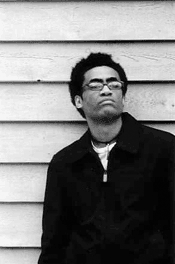
introducing readers to writers since 1995
April 27, 2005
Author2Author: Thomas Sayers Ellis and Lyrae Van Clief-Stefanon, pt. 1
by Ron HoganAs National Poetry Month winds down, Author2Author welcomes two outstanding African-American poets to share with other how their verse has developed. Thomas Sayers Ellis's most recent collection, The Maverick Room, was published by Graywolf earlier this year (read an excerpt). Lyrae Van Clief-Stefanon's first collection of poems, Black Swan, won the Cave Canem prize for new African-American poetry when it was published in 2001 (read Bop: Haunting"). Prodded by Thomas, she lets us know what she's up to now...
 Thomas Sayers Ellis: What are you working on now? How far have you moved away from Black Swan and myth, and how far from mixing the way we talk with the way mythologies are fixed? Do you really like Myth or were you simply unhappy with its cultural positioning as "king of meaning" and "king of container"? Myth has always behaved like a Gangsta to me, and a bad big brother to, or white owner of, folklore. Lord knows I'm waiting for 'lore to poison Massa with-the-quickness and leave Quikskill's mouth-running (see Ishmael Reed's Flight to Canada) note on his chest. Certain mythologies, then, seem bad owners to me. Users, full of pimpin', and out-dated show-offs.
Thomas Sayers Ellis: What are you working on now? How far have you moved away from Black Swan and myth, and how far from mixing the way we talk with the way mythologies are fixed? Do you really like Myth or were you simply unhappy with its cultural positioning as "king of meaning" and "king of container"? Myth has always behaved like a Gangsta to me, and a bad big brother to, or white owner of, folklore. Lord knows I'm waiting for 'lore to poison Massa with-the-quickness and leave Quikskill's mouth-running (see Ishmael Reed's Flight to Canada) note on his chest. Certain mythologies, then, seem bad owners to me. Users, full of pimpin', and out-dated show-offs.
Lyrae Van Clief-Stefanon: I'm working on a manuscript called Open Interval. It is a meditation on identity using the universe as lens. It is preoccupied with stars, particularly RR Lyrae stars. Myth's still there, in some ways, and for the very reasons you mentioned. If myth is king of meaning, king of container, one way to subvert that shit is to bogart it, create a mythologized, black, woman, literary self as constellation.
I think RR Lyrae stars are useful for that. In astronomy they are "standard candles," objects with a known luminosity, measuring distance. You can use them to tell the ages of galaxies. I think they work particularly well semiotically. They open up some fascinating possibilities. I'm into the RR as crossroads, as blues sign; I'm into the "are, are" sound, particularly posited against the "I am" of identity. So, the book's definitely in conversation with Black Swan.
your PayPal donation
can contribute towards its ongoing publication.